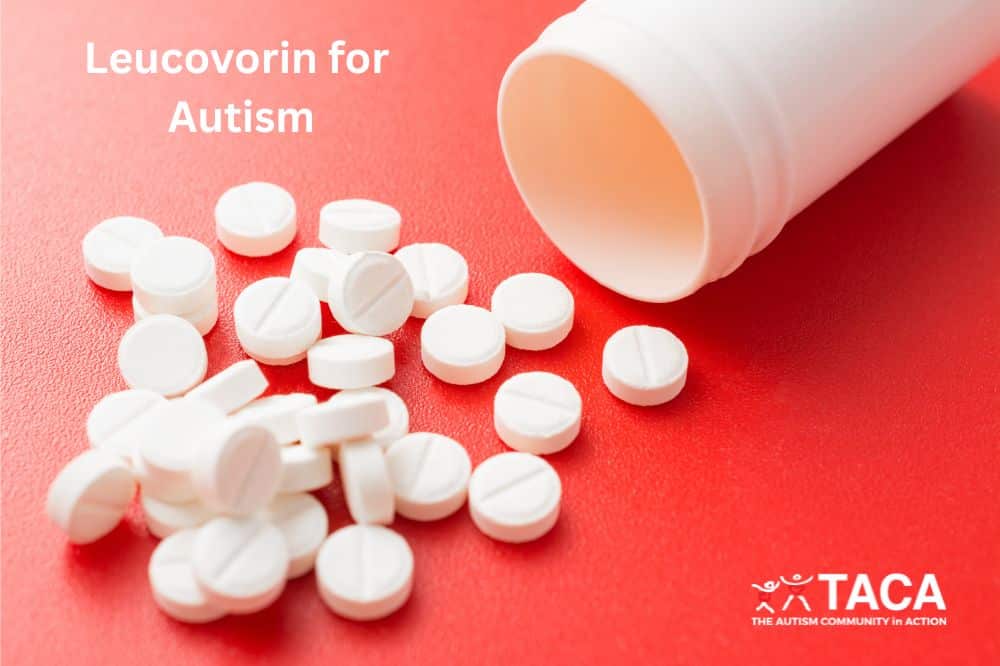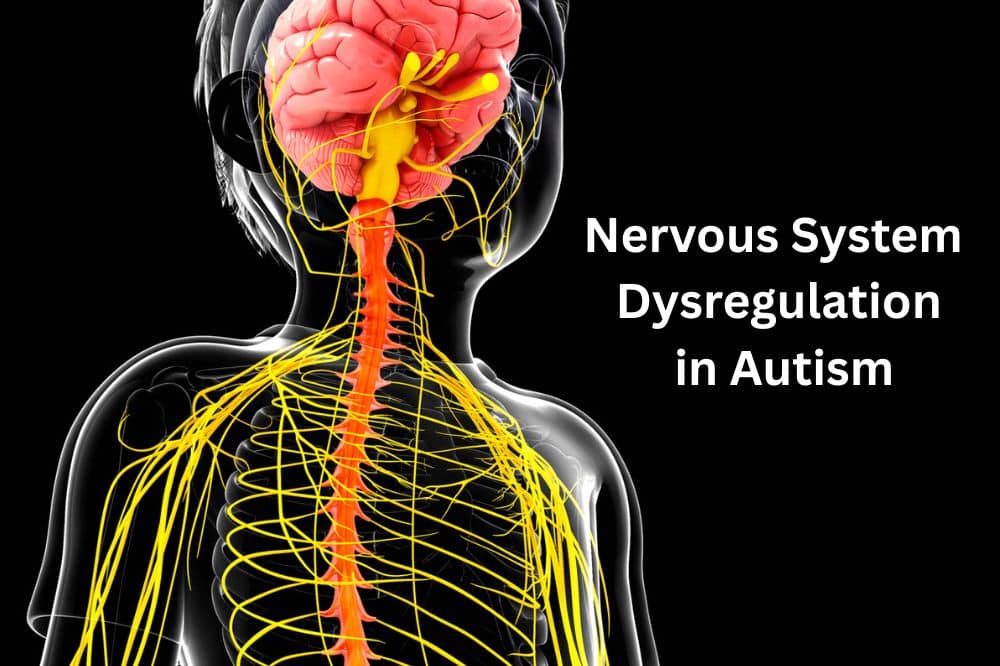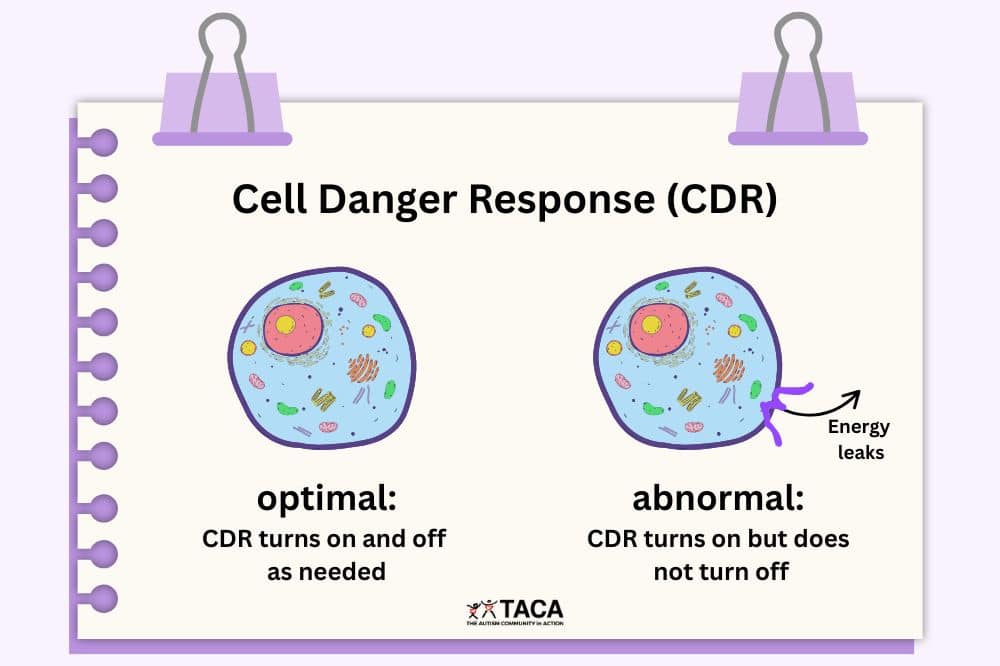Methyl B12 for Autism
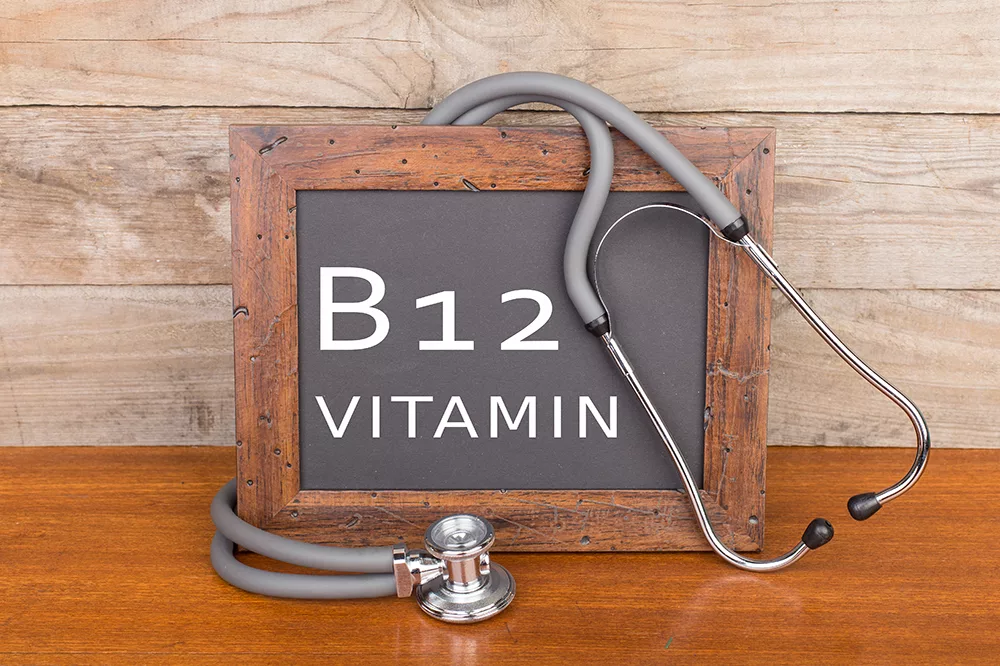
All contents of this resource were created for informational purposes only and are not intended to be a substitute for professional advice, diagnosis, or treatment. Always seek the advice of your physician, therapist, or other qualified health providers with any questions or concerns you may have.
Research has shown that Methyl B12, also known as methylcobalamin, can help relieve symptoms of autism. In the body, B12 assists with detoxification because it is a critical factor of the methylation pathway that helps the body make the powerful antioxidant, glutathione. This is helpful because research shows that kids with autism have poor methylation, which directly impacts cognition, energy production, detoxification pathways, and more.
This article will discuss:
- Improvements seen with Methyl B12
- Reasons to use MB12 for Autism
- Testing for B12 levels
- How to give MB12
- Possible Side Effects
- Dosing Vitamin Methyl B12
- Reasons for elevated B12 in the blood
- Different forms of B12 and their functions
- What the research says
What is B12?
B12, also known as cobalamin, is a B vitamin. This vitamin plays an essential role in red blood cell formation, cell metabolism, nerve function, and the production of DNA. Even if you eat plenty of food high in vitamin B12, you can still be deficient if your body cannot absorb it. B12 has 4 different forms: Methyl B12, Adenosyl B12, Hydroxo B12, and Cyano B12.
Methyl B12 can help with:
- Speech
- Sleep
- Energy
- Processing Speed (Cognition)
- Focus and attention

Why use Vitamin B12 for autism?
There are numerous reasons that B12 benefits those with autism including gastrointestinal abnormalities, diet, genetics, and more.
Gastrointestinal Abnormalities
- Unlike other vitamins, gut bacteria both uses and produces B12.
- However, in autism, there may be less beneficial bacteria to produce B12.
- GI Disorders, common in autism, interfere with the absorption of B12.
- Examples include gastrointestinal disorders such as Crohn’s Disease, enteritis, or celiac disease.
- Pathogenic bacteria are common in autism.
- Gut dysbiosis can result in pathogenic bacterial overgrowth or parasites, which can consume vitamin B12 before it is properly absorbed.
B12 absorption is a complex process
- B12 found in food follows a complex, two-step pathway in order to be absorbed into the bloodstream.
- First, hydrochloric acid in the stomach separates vitamin B12 from the attached protein.
- Second, the vitamin B12 then combines with intrinsic factor made by the stomach.
- For proper B12 absorption, these two steps must be completed.
- Therefore, B12 from food or oral supplements will be poorly absorbed if:
- There is low stomach acid due to use of a Proton Pump Inhibitor (PPI)
- There is low intrinsic factor.
- Pernicious anemia is an autoimmune disease that occurs when the body fails to produce intrinsic factor.
Restricted, vegan, or vegetarian diets are a risk factor for low B12
- Kids with autism can be picky eaters or follow specialized diets.
- Meat, eggs, and dairy are B12 food sources.
- Therefore, a vegetarian, vegan, or restricted diet is a risk factor for B12 deficiency.
- In addition, Children born to vegetarian or vegan mothers are also at risk for B12 deficiency and therefore, neurological problems.
Genetics play a role in B12 deficiency
- Genetic polymorphisms such as MTHFR or MTRR can contribute to low usable B12.
- These polymorphisms may result in difficulty with the process of methylating B12 into its usable form.
- In this case, the body is absorbing enough B12, but it is unable to use it.
Methyl donors affect mood and sleep
- Methyl B12 has a methyl donor attached to it’s structure.
- Methyl donors are needed to make a neurotransmitter called serotonin, which controls mood.
- In turn, serotonin contributes to melatonin production, which is needed for sleep.
*Newly Discovered Autoantibodies Block CD320 protein from carrying B12 to the Brain*
- In April 2024, a paper was published showing that low B12 in the brain can be tied to autoimmunity.
- CD320 is a protein that carries B12 across the blood-brain barrier.
- This study showed that in some people, autoantibodies are blocking CD320 from getting B12 into the cerebrospinal fluid to carry it to the brain.
- This early study showed that approximately 20% of the sample were diagnosed with autism.
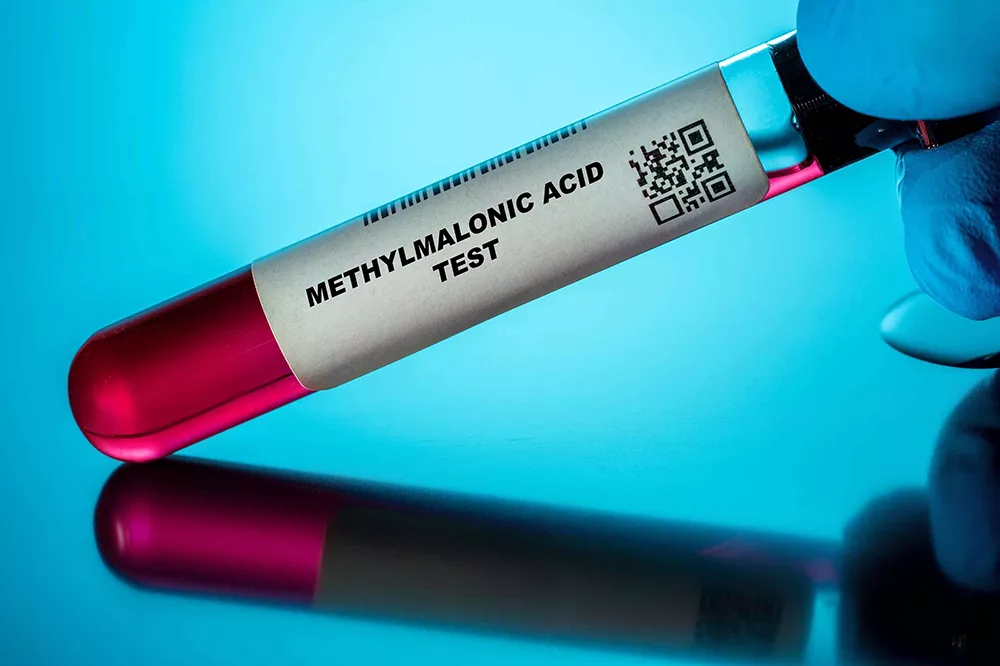
Testing B12 levels
- Blood testing cannot determine B12 need. This is because, in autism, doctors are treating low B12 in the brain.
- Normal B12 in the blood does not equate to normal B12 in the brain.
- In fact, there is no way to test B12 levels in the brain.
- Not even a lumbar puncture (spinal tap) can test for B12 levels in the brain.
- Therefore, most functional medicine doctors treat empirically to see how a person responds.
- Elevated MMA can be a marker for low B12.
- When the mutase enzyme is impaired, methyl malonic acid (MMA) accumulates. MMA prevents the production of fatty acids.
- You can check MMA (methylmalonic acid) on an OAT (Organic Acid Test).
- Adenosylcobalamin (AB12) reduces MMA.
- Therefore, even if MMA is normal, your child may still need Methyl B12, as it serves a different function.
- Low red blood cells (RBC) can be a marker for low B12.
- Hemoglobin production requires B12.
- Your pediatrician or doctor can order this standard CBC bloodwork.
- A normal RBC does not rule out a need for B12 supplementation.
- High MCH can be a marker for low B12 (and folate)
- Elevated MCH (Mean corpuscular hemoglobin) value can be caused by anemia due to B12 and folate deficiencies.
- This test measures the average amount of hemoglobin (the protein that carries oxygen) in the red blood cells.
- An elevated MCH value is not always related to a B12 deficiency. It can also be a red flag for anemia, folate deficiency, liver disease, hypothyroidism, or GI inflammation.
- In addition, your pediatrician can order this standard CBC bloodwork.
- Again, if this result is normal, your child may still require B12 supplementation for all the reasons stated above.

How to give B12
Swallowed B12 is not recommended as many kids with autism have compromised GI function, and therefore it is not well absorbed. For this reason, there are numerous other ways to administer Methyl B12 supplementation. Additionally, B12 and Vitamin C should be taken a few hours apart.
- Methyl B12 shots
- Your doctor will need to prescribe MB12 shots.
- In addition, B12 shots must be compounded.
- If they are not, they could be the wrong form of B12 such as cyanocobalamin or they could have added preservatives that you do not want injected into your child.
- A functional medicine doctor will prescribe compounded methyl B12 shots.
- Moreover, compounded B12 shots should come prefilled by the compounding pharmacy.
- Refrigeration required.
- Additionally, here are Dr. Neubrander’s instructions on Methyl B-12 shots.
- Methyl B12 drops
- Drops are effective because they are sublingual.
- Still, the drops need to be placed directly into the mouth, not mixed into a drink.
- This allows the B12 drops to be absorbed directly into the mucosa of the mouth.
- Methyl B12 lozenges
- These also encourage mucosal absorption.
- Methyl B12 patches
- These can be easy to use.
- However, the amount of B12 absorption it is very difficult to measure.
- Topical Methyl B12
- Lotions may be helpful if there are absorption issues, but again, it is difficult to know how to dose appropriately.
Possible Side Effects
- B12 gives energy. Because of this, you can see hyperactivity, mouthing items, and increased stimming while the body adjusts to it.
- Moreover, it is generally suggested to give B12 in the morning or no later than 2pm to avoid potential sleep issues.
- Typically, it takes about 5 weeks for these symptoms to settle down.
- You may find that doctors start by giving calming supplements such as lithium orotate, GABA, L-Theanine, fish oil, and/or valerian root before starting a stimulating supplement such as Methyl B12.

Dosing Methyl B12
B12 is a water soluble vitamin, meaning the body uses what it needs and then excretes excess in the urine. It is a low risk vitamin without a tolerable upper intake level. Therefore, vitamin B12 has a safe profile. The research has shown different methods of administration of Methyl B12. As always, discuss dosing with your functional medicine doctor.
- Subcutaneous B12 shots
- Per the research, methyl B12 is dosed at 64.5 – 75 mcg/kg per dose every 3 days via injection.
- Oral B12 (given sublingually)
- MB12 liquid
- The research used 500 mcg per day
- Although B12 is a very safe vitamin, always be on the lookout for these symptoms when using high doses:
- Headache
- Nausea and vomiting
- Diarrhea
- Fatigue or weakness
- Tingling sensation in hands and feet
Possible explanations for elevated B12 (without supplementation) in the blood
- SIBO (Small Intestine Bacterial Overgrowth)
- SIBO may cause very elevated levels of B12 in the blood. In SIBO, the beneficial bacteria that is normally only found in the large intestine, is located where it should not be – the small intestine.
- The bacteria collected in the small intestine has the ability to make B12. There can be excess B12 production when you have too much bacteria.
- However, this does not rule out B12 supplementation. The pathogenic bacterial overgrowth can consume the Vitamin B12 before it is properly absorbed.
- Once SIBO is effectively treated, blood levels of B12 may normalize.
- Inability to convert B12 to a usable form
- As is mentioned above, there are polymorphisms (MTHFR, MTRR) that can inhibit the body from converting B12 to a usable form.
- These polymorphisms can result in elevated vitamin B12 levels despite the body’s inability to use it properly.
- This problem is remedied by using a Methyl B12 supplement.
- Low levels of lithium orotate
- Lithium orotate is a naturally occurring essential mineral.
- The body requires lithium in trace amounts.
- However, high levels of lithium are toxic.
- Per research, proper transport of B12 requires an adequate amount of lithium orotate.
- B12 pooling can occur when there is not adequate transport.
- Lithium orotate is a naturally occurring essential mineral.

Different forms of B12 and their functions
Methylcobalamin (MB12)
- This is the most bioavailable form of B12, making it easiest for the body to use. Methyl B12 has many functions:
- Helps methylation.
- Methylation produces homocysteine. In turn, some homocysteine is used to make cysteine, which then combines to form glutathione.
- This is important because glutathione is the body’s biggest antioxidant.
- That makes methylation critical to the body’s detoxification process.
- In addition, methylation also keeps certain genes from turning on.
- Finally, it keeps homocysteine from getting too high and causing cardiac issues.
- Methylation produces homocysteine. In turn, some homocysteine is used to make cysteine, which then combines to form glutathione.
- Supports healthy brain cells and nerve function.
- Improves memory.
- Regulates the body’s metabolism.
- Improves blood flow to the brain.
- Treats depression and anxiety.
- Needed for production of red blood cells.
- If you don’t have enough B12 in a form that you can use, you will become anemic. Therefore, methyl B12 can be a treatment for low red blood cells or low hemoglobin.
Adenosylcobalamin (AB12)
- Adenosylcobalamin is the most common form of vitamin B12 found in the human body’s cells, organs, and tissues.
- Additionally, it is also the most common form of B12 found in food.
- Important for energy production
- Therefore, it helps with mitochondrial dysfunction, which is commonly found in autism.
- Lastly, AB12 is an important part of the myelin sheath which protects the nerve cells in the brain.
- This allows nerve cells to respond quickly to stimuli.
Hydroxocobalamin (HB12)
- This is a natural form of B12.
- It works to decrease inflammation.
- Lastly, HB12 is sometimes prescribed if methyl B12 and Adenosyl B12 are not tolerated.
Cyanocobalamin (CB12)
- Cyanocobalamin is a synthetic form of Vitamin B12
- Therefore, it must convert to methylcobalamin and this process many not be efficient due to genetics.
- Consequently, this is not a good form of B12 to use.

What the research is telling us
Low Levels of B12 found in postmortem brains
- In the samples of 12 postmortem autistic brains, the level of B12 was 3x lower than in typical postmortem brains.
- Source: Decreased Brain Levels of Vitamin B12 in Aging, Autism and Schizophrenia (2016)
Remarkable improvements with B12 and folinic acid treatment.
- On average, skills were improving drastically in only three months. For instance, six months of language improvement in 3 months.
- Source: Effectiveness of methylcobalamin and folinic Acid treatment on adaptive behavior in children with autistic disorder is related to glutathione redox status. (2013)
Methyl B12 treatment improved symptoms of autism
- The improvements correlated with increased levels of methionine metabolism and cellular methylation.
- Source: Randomized, Placebo-Controlled Trial of Methyl B12 for Children with Autism (2016)
Analysis of several studies showed significant improvements autism symptoms from Methyl B12. These included:
- Expressive communication
- Personal and domestic daily living skills
- Interpersonal skills
- Play-leisure skills
- Coping social skills
- Other clinical improvements observed with B12 included improvements in:
- Sleep
- Gastrointestinal symptoms
- Hyperactivity
- Tantrums
- Nonverbal intellectual quotient
- Vision
- Eye contact
- Echolalia
- Stereotypy
- Anemia
- Nocturnal enuresis (bed wetting)
- Adverse events with B12 identified by meta-analysis included:
- Hyperactivity (11.9%)
- Irritability (3.4%)
- Trouble sleeping (7.6%)
- Aggression (1.8%)
- Worsening behaviors (7.7%)
- But adverse effects were generally few, mild, not serious, and not significantly different compared to placebo.
- In one study, 78% of parents desired to continue mB12 injections after the study conclusion.
- This meta-analysis looked at 17 studies on B12 supplementation in autism, 4 of which were double blind, placebo-controlled studies.
- Source: The Effectiveness of Cobalamin (B12) Treatment for Autism Spectrum Disorder: A Systematic Review and Meta-Analysis (2021)
Methyl B12 as a syrup showed promising improvements in individuals with autism, most likely because it improved oxidative status.
- Improvements strongly associated with the changes in the level of reduced glutathione and reduced/oxidized glutathione ratio.
- There was an overall improvement in clinical and psychological status
- In addition, most improvements were in social skills.
- Source: Improvement of the Clinical and Psychological Profile of Patients with Autism after Methylcobalamin Syrup Administration(2022)
Conclusion
Methyl B12 can be beneficial to children and people with autism due to numerous factors. While not every child responds the same way to supplementation, the research shows that a trial of methyl B12 may be worth consideration.

